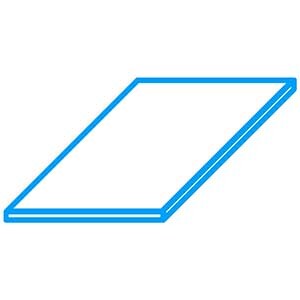Aluminum Sheets
19 Product(s)

















Aluminum sheets overview
Aluminum panels are essential materials in numerous industrial and architectural applications. These plates combine lightness with attractive strength and corrosion resistance, making them the ideal choice for construction projects, mechanical engineering and many other areas.
Unique selling points
-
Light and stable: Aluminum panels offer an excellent strength to weight ratio. They are significantly lighter than steel plates, making transportation and installation easier while not compromising structural integrity.
-
Corrosion resistance: Thanks to the natural oxide layer on aluminum, these panels have good to very good corrosion resistance, depending on the material. This makes them ideal for use in damp or chemically contaminated environments.
-
Versatility: The panels are available in a variety of dimensions and thicknesses, making them adaptable to different applications. From light construction to heavy industrial applications, they offer a flexible solution.
-
Aesthetic and functional benefits: Aluminum panels have an attractive metallic surface that can be additionally polished or anodized to ensure even greater corrosion resistance and an attractive appearance.
Technical specifications and advantages
-
Material: Aluminum EN AW-5083, EN AW-5754, EN AW-1050A
-
Dimensions: Vary from 8 x 1020 x 2020 mm up to 200 x 1020 x 2020 mm
-
Lengths: Standard length of approx. 3020 mm (up to 6000 mm), but can also be made to measure.
-
Weight: Lightweight construction with weights from approx. 45.35 (based on the dimensions mentioned 8 x 1020 x 2020 mm)
-
Surface treatment: Available in ground, anodized or polished finish.
Areas of application
-
Construction: Ideal for the construction of frames, columns and beams in buildings and bridges.
-
Mechanical engineering: Use in machines and devices where lightness and stability are required.
-
Furniture design: Commonly used in modern furniture pieces that are intended to be both functional and aesthetically pleasing.
-
Transportation: Used in vehicle designs, particularly trailers and commercial vehicles, to reduce overall weight and improve fuel efficiency.
Why you should choose aluminum panels
Aluminum panels offer a perfect combination of lightness, strength and Material dependent Corrosion resistance. They are versatile and meet the highest requirements in construction and industrial projects. Their different dimensions and surface treatments allow them to adapt seamlessly to the specific needs of each project.
Conclusion
Discover the benefits of aluminum panels for your next project. Contact us today to learn more about our products and services or to request a quote. Our experts are at your disposal to offer you the best possible solution.
Frequently asked questions (FAQ) about aluminum panels
1. What are the advantages of aluminum plates compared to steel plates?
Aluminum panels are lighter than steel panels, making it easier to transport and install. They also offer good to very good corrosion resistance due to the aluminum's natural oxide layer, making them ideal for applications in moist or corrosive environments. Additionally, aluminum panels are easier to machine and more aesthetically pleasing because they can be polished or anodized.
2. What dimensions are aluminum plates available in?
Aluminum panels are available in a variety of dimensions. Standard sizes range from 6 x 1020 x 2020 mm up to 200 x 1020 x 2020 mm. This variability allows it to be used in different applications, from light construction to heavy industrial projects.
3. What surface treatments are available for aluminum panels?
Aluminum panels can be provided with various surface treatments to improve their corrosion resistance and aesthetics. Common treatments include polishing, grinding and anodizing. Anodizing offers additional protection against corrosion and gives the aluminum an attractive, colored surface.
4. How resistant are aluminum panels to corrosion?
Aluminum panels have good to very good corrosion resistance, depending on the material, as aluminum naturally forms a protective oxide layer. This layer hinders the attack of moisture and chemical substances that could lead to corrosion.
5. Which applications are particularly suitable for aluminum plates?
Aluminum plates are versatile and suitable for numerous applications. They are often used in construction for frames, columns and beams. In mechanical engineering they are used in light and stable machines and devices. They are valued in furniture design for their aesthetic and functional advantages. They are also popular in transportation, particularly in the design of vehicles and trailers to reduce overall weight and improve fuel efficiency.